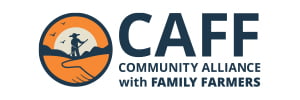Growing Urban Agriculture Microgrants
Deadline for Application: Sunday, March 31, 2024, 11:59 pm PST
Frequently Asked Questions
Community Alliance with Family Farmers (CAFF), Agroecology Commons, Food Access Los Angeles, Los Angeles Food Policy Council (LAFPC), Veggielution, and University of California Agriculture & Natural Resources (UC ANR) have partnered with the USDA Farm Service Agency (FSA) to offer Growing Urban Agriculture Microgrants. Growing Urban Agriculture Microgrants will fund urban producers in the Los Angeles, Orange, Santa Clara, San Mateo, San Francisco, Alameda, Contra Costa, Marin, Solano, Napa, and Sonoma counties who are growing crops for community consumption and utilization.
A microgrant can provide up to $10,000 for projects to applicants that operate a business, organization, collective/cooperative, or site dedicated to urban agriculture that may need financial support to implement, such as site development, equipment, technical assistance, practices improving soil quality and conservation, and more. Priority will be given to those operations growing for their communities as well as operations that are led by and/or serve urban communities that have been historically underserved.
To be eligible, applicants must operate a business, organization, collective/cooperative, or site dedicated to urban agriculture. Urban Agriculture refers to the cultivation, processing, and distribution of agricultural products in urban settings, and is defined as a geographic area no more than 25 miles adjacent to or outside of one Urbanized Area containing a population of 50,000 or more people.
This can include operations like inground small plot cultivation, raised beds, vertical production, warehouse farms, mushroom growing, urban forestry and tree care, community gardens, rooftop farms, hydroponic, aeroponic, and aquaponic facilities, and other innovations.
Producers must be located in the Los Angeles, Orange, Santa Clara, San Mateo, San Francisco, Alameda, Contra Costa, Marin, Solano, Napa, or Sonoma counties to apply for this grant.
The grant application window is from March 1st through March 31st, 2024. Applications must be submitted via Google Docs. If you cannot access the application, you will need to create a Google account.
Yes, the application packet is visible at this link. However, you must use the “Click Here to Apply” button above on the page in order to submit your application via Google Form.
Applicable producers can include community-based, for profit, and nonprofit organizations, and local governments and schools. Urban farmers and gardeners work among diverse populations to expand access to nutritious foods, foster community engagement, offer workforce development opportunities, educate communities about food and farming, and expand green spaces. Priority will be given to those operations growing for their communities as well as operations that are led by and/or serve urban communities that have been historically underserved.
Due to the limited funds available, only one-year projects will be considered. Projects may begin as soon as May 1, 2024 and must be completed by April 31, 2025.
75% of grant funds will be made available upon completion of the contract agreement. The remaining 25% will be disbursed upon adequate project completion and submission of the Final Report. Microgrant recipients must provide a brief reflection on what was accomplished from your project shared via a written response, voice recording, in conversation, or a short video, whichever format you prefer. CAFF and partners will also be holding a 6-month progress check-in during the project period.
- Farm equipment (includes tractor, vehicles, etc.)
- Farm supplies
- Cost of repairing or buying new Infrastructure (includes labor)
- Labor related to farm business
- Farm Insurance
- Business registration fees
- Legal fees
- Technical assistance
- Beekeeping and equipment
- Bookkeeping and crop planning software
- Flowers and fibers
- Vertical/indoor farming projects
- Cold storage
- Sprouts/microgreens
- Seed saving, water conservation, native plant gardens, medicinals

